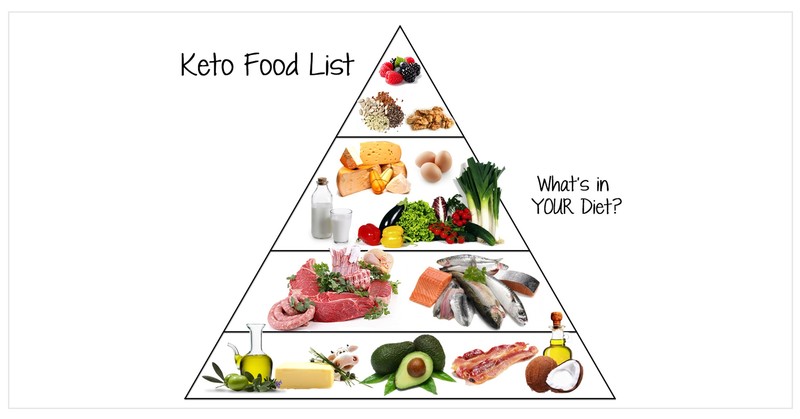Ketogenic diet- What doctors should know: Dr. Sundeep Mishra
M3 India Newsdesk Mar 05, 2020
Dr. Sundeep Mishra writes on the ketogenic diet, its benefits apart from weight loss, particularly studies that have dealt with the positive effects it may have for patients with diabetes and risk factors for CAD.

Despite the recent fad, a ketogenic diet is not something new. Its use in medicine is nearly a century old, to treat drug-resistant epilepsy, especially in children. However, its popularity in lay press dates to the decade of 70s whence Dr. Robert Atkins popularised his very-low-carbohydrate diet for weight loss that began with a very strict two-week ketogenic phase.
Concept of ketogenic (keto) diet
It is a diet that restricts carbohydrates while emphasising protein and fats and causes the body to release ketones into the bloodstream. Ketones are produced as fuel from metabolised fats (acetyl-CoA) when carbohydrate-derived pyruvate (derived from metabolism of blood sugar) is low. Most cells are able to switch over to use ketone bodies instead of blood sugar for their metabolism as enzymes are present within all cells to convert ketones into fuel except in erythrocytes, cornea, lens and retina. The residual ketone is excreted into urine. The shift, from using circulating glucose to breaking down stored fat as a source of energy, usually happens over 2 to 4 days of eating fewer than 20 to 50g carbohydrates per day.
What constitutes the keto diet?
Carbohydrates normally account for at least 50% of the typical Western diet but may account for 60 to 70% of Indian diet. Ketogenic diet is a low or even a no carbohydrate (<10 to 15%) diet which is rich in proteins and particularly fats. It typically includes plenty of meats, eggs, fish, milk products like cheese and butter, nuts, butter, oils, seeds, and fibrous vegetables.
The diet avoids carbohydrate rich vegetables like tubers (potato, carrot, turnip) but encourages lots of low carbohydrate leafy vegetables like spinach (palak), mustard greens (sarson), cabbage (patta gobhi), amaranth (lal bhaji) and salad greens like lettuce, kale, parsley etc.
However, in an attempt to reduce the amount of carbohydrate there is a possibility that there could be a use of lots of processed foods, especially meats, fish etc. instead of fresh foods.

Benefits of keto diet
- Weight loss: It is the primary effect of ketogenic diet and therefore it can be used in obese individuals. Several RCTs have revealed that low carbohydrate diets typically produce more weight loss than low fat diets especially in insulin resistant individuals.
- Blood sugar regulation: Being low in carbohydrates it can also regulate blood sugar and therefore can be useful in patients with type 2 diabetes mellitus and metabolic syndrome, at least in the short term.
- Lower risk of CAD: The direct impact of this diet on cardiovascular disease is more controversial. No trial has shown benefits of this diet on hard coronary end-points. However, this diet may have impact on several risk factors of CAD.
- Some studies have revealed that some patients have increase in cholesterol levels in the beginning (because of high fat content of diet), only to see cholesterol levels fall a few months later.
- On the other hand, the diet being rich in fresh vegetables which have high nutrient density, being balanced both in macro & micro-nutrients (minerals and vitamins), rich in fibres, phytochemicals and anti-oxidants, but low in calories and sodium can favourably impact CAD.
- This diet being low in sodium (if processed foods are not taken) can reduce the risk of hypertension as well.
Thus while direct effect of the diet on CAD may be minor, it can control many risk factors of CAD like DM (blood sugar control), hypertension (low sodium due to fresh vegetable consumption), and obesity (weight loss), which may be beneficial if it is sustained long term.
- Neurological disorders: Since neuroprotective effects of ketpogenic diets have been demonstrated in epileptogenic children refractory to usual medication, there may be possible benefits in other brain disorders as well, such as Parkinson’s, Alzheimer’s, multiple sclerosis, sleep disorders, autism, and even brain cancer. However, there are no good human studies to support recommending ketosis in these conditions at the moment.
Limitations of keto diet
- The main limitation of keto diet is that it is very restrictive (of different types of foods) and thus difficult to follow over the long run. Typically, individuals start on this diet with a lot of commitment, follow for a few days to weeks, but then start returning to their previous diets losing all their benefit.
- Rapid weight loss with over-enthusiastic initiation is another big problem, because that is in itself associated with several harms.
- Another criticism is that it is rather difficult to balance this diet. Typically individuals on this diet may consume too much protein but poor-quality fats (from processed foods), with very few fruits and vegetables. The crux is to finely balance the diet so that there is no acute deficiency of essential nutrients but at the same time avoid processed foods which may be rich in saturated/trans fats and sodium but poor in antioxidants.
- These diets may be low in vitamin C, beta carotene and fibre if carbohydrate is severely restricted (<20 g/day). Potassium and sodium levels should be monitored and may need to be supplemented during the first month of the diet, as they are additionally excreted in the urine.
- Studies have revealed greater urinary acid and calcium excretion among those on ketogenic diet due to the increase in sulfur-containing amino acids from protein foods and acidic ketone bodies. While there is no metabolic acidosis, the increased urinary acid excretion could increase the risk of renal stones and increased excretion of protein metabolites may worsen chronic renal disease. Increased calcium excretion without compensatory increase in intestinal calcium absorption may lead to bone loss.
- Other minor disadvantages could be feeling of tiredness (due to low sugar levels) in the beginning, but also issues of bad breath, nausea, vomiting, constipation, and sleep disturbances.
Disclaimer- The views and opinions expressed in this article are those of the author's and do not necessarily reflect the official policy or position of M3 India.
The author, Dr. Sundeep Mishra is a Professor of Cardiology.
-
Exclusive Write-ups & Webinars by KOLs
-
Daily Quiz by specialty
-
Paid Market Research Surveys
-
Case discussions, News & Journals' summaries